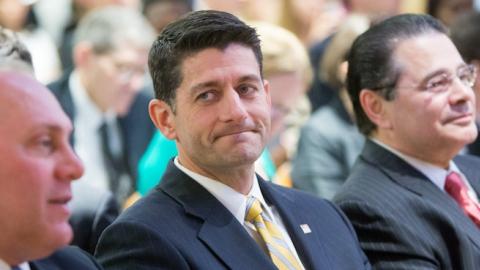It has long been obvious that it's not too hard to design a health-care plan that beats Obamacare. Nonpartisan scoring now finds that the House Republican health-care plan (released earlier this summer) would beat Obamacare in terms of reducing premiums, reducing federal spending, increasing access to doctors, and increasing the number of people with private health insurance, while Obamacare would beat the House GOP plan in terms of dumping huge numbers of people into Medicaid.
The nonpartisan Center for Health and Economy (H&E), co-chaired by liberal Princeton economist Uwe Reinhardt and center-right former Congressional Budget Office (CBO) Director Douglas Holtz-Eakin, conducted the scoring. The House GOP plan calls for non-income-tested, refundable tax credits for those who buy health insurance on their own, but it doesn't specify the exact dollar values of those tax credits. H&E "assumed" that the dollar values would match those proposed in my Alternative to Obamacare (published by the Hudson Institute)—values that were originally proposed in the alternative released by the 2017 Project (which I ran) and were subsequently adopted in the alternatives put out by Virginia senate candidate Ed Gillespie, House Budget Committee Chairman Tom Price, and Wisconsin governor Scott Walker. These plans would all offer tax credits of $1,200 for those under 35 years of age, $2,100 for those between 35 and 50, and $3,000 for those 50 and over, plus $900 per child.
Under such assumptions, H&E's scoring finds that—versus Obamacare—the House GOP plan would reduce premiums in the individual market by about 20 percent (ranging from a 9 percent average reduction for "bronze"-level individual plans to a 35 percent average reduction for "catastrophic" family plans), reduce federal spending by $699 billion over a decade, increase access to doctors by 4 percent, and increase the number of people with private health insurance by 13 million. So it would result in 13 million more people having private health coverage while costing about $700,000,000,000 less.
Obamacare, meanwhile, would outpace the House GOP plan in terms of the number of people put on Medicaid—by 18 million. Aside from increasing Americans' insurance premiums and coercing them into buying federally approved health insurance, Obamacare is basically a massive Medicaid expansion. That's where most of its coverage increases come from. Even if one were to regard an increase in Medicaid enrollment as a good thing—which is highly debatable—Obamacare would cost nearly $700 billion more than the House GOP plan over a decade while covering only an additional 5 million people by 2026 (18 million more via Medicaid, 13 million less via private insurance). That works out to $139,800 for each additionally covered person.
America's health insurance woes have long resulted in large part from the federal government's having had its foot on the scale (even before Obamacare broke the scale). Millions of Americans have gotten generous tax breaks for employer-based insurance (which isn't included as taxable income), while millions of Americans who buy health insurance on their own haven't gotten a tax break (but have had to pay taxes on the income they spend on that insurance). Long-overdue tax credits of $1,200 for those under 35, $2,100 for those between 35 and 50, and $3,000 for those over 50, plus $900 per child, would be money in these Americans' pockets—while most middle-class Americans get nothing from Obamacare but the tab.
A middle-class family of four could sure use the tax cut of $6,000 that such tax credits could provide. Yet few Republicans have taken advantage of the inviting opportunity to talk about how such a well-conceived conservative alternative to Obamacare would clearly improve Americans' lives—despite Gillespie's political success in doing so, and despite the party's frequent talk of wanting to advance a Main Street-friendly agenda.
In addition to the myriad of ways in which the House Republican plan plainly beats Obamacare, H&E's scoring also points to one big potential flaw in the GOP plan. H&E (quite sensibly) assumed that when House Republicans talk of giving an "advanceable...tax credit," what they mean is not giving a genuine tax credit to an individual or family—which, for anyone who pays income taxes, would mean a tax cut—but a direct subsidy to an insurance company.
This is the same game Obamacare plays, in the process hiding huge quantities of federal spending—as this graphic depicts. Direct federal outlays to third parties are clearly federal spending. Under Obamacare, however, some $104 billion in direct outlays to insurance companies are falsely labeled as "tax credits" (and erroneously scored by the CBO as "tax cuts"), even though they don't actually cut anyone's taxes.
Republicans shouldn't follow Obamacare's lead in this way (or, really, any other). Instead, they should offer legitimate tax credits, not direct subsidies to insurance companies. They can solve this potential problem either by making their tax credits non-advanceable, or else by making them advanceable in such a way (per the 2017 Project's suggestion) that they are genuinely tax credits, as defined by the Government Accountability Office. That's a relatively easy fix, however, whereas there's no fixing Obamacare.
The fate of the House GOP plan will largely hinge on the results of the November election. To pass it (using the "reconciliation" process), Republicans will need to keep control of the Senate. In terms of getting it signed into law, Donald Trump has been briefed on the House GOP alternative and likes it, while Hillary Clinton supports keeping and expanding Obamacare.















